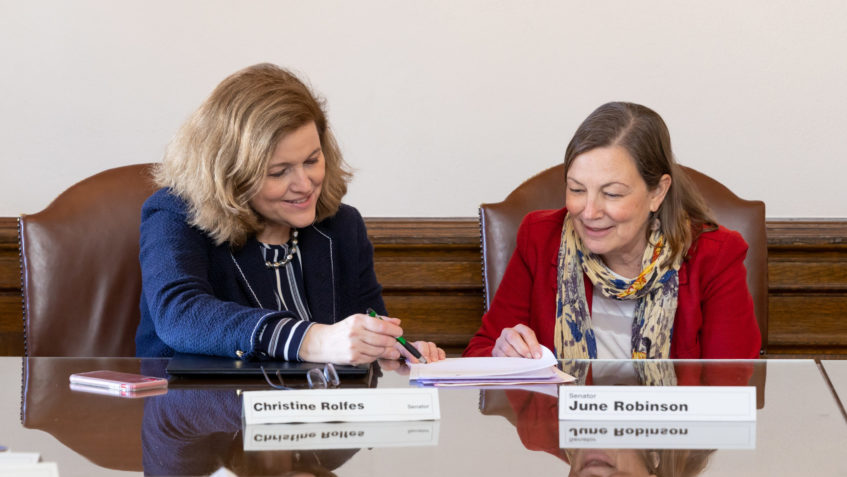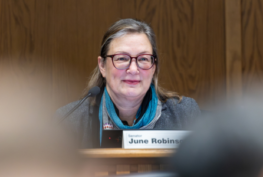OLYMPIA – The Washington State Senate passed a $69.2 billion, two-year budget today on a 40-9 vote to increase funding for vital state services, including targeted support for behavioral health, public schools, housing and homelessness, and a historic investment to address the climate crisis.
The two-year operating budget adds roughly $5 billion in new spending and does not rely on any new general taxes or fees. It leaves more than $3 billion in total reserves to guard against an economic slowdown and protect the state’s historically high credit rating.
“Our state’s biggest challenges are prioritized in this budget. It boosts funding for behavioral health and will strengthen our public schools,” said Sen. Christine Rolfes (D-Bainbridge Island), chair of the Senate Ways & Means Committee. “It’s a budget that responds to the needs and concerns we’ve heard from people across this state, and delivers strategic, thoughtful investments in crucial services and supports.”
The budget makes the largest investment in K-12 education since the McCleary court decision, with a focus on special education. A total of $2.9 billion in new spending will go to the state’s public schools to address learning loss from the pandemic, support workforce needs, and deal with higher costs due to inflation. Roughly $360 million in new spending over the next two years will support special education services and $106 million will help expand the Early Childhood Education and Assistance Program.
It includes $424 million in new spending to support efforts to transform the state’s behavioral health system, including funding for new behavioral health crisis facilities, more community-based housing, and new programs to support people with special needs such as developmental disabilities or chronic mental illness. The budget also provides funding to boost treatment services for children and youth. In addition, more than $50 million from opioid settlement agreements will support treatment for substance use disorder.
“We know many of the problems facing our state are intertwined,” said Sen. June Robinson (D-Everett), vice chair of the Ways & Means Committee. “That’s why our proposal takes a holistic approach and makes targeted investments to address the root causes of these issues — like housing and behavioral health — so we can give our neighbors the resources and support they need to lead healthy, productive lives.”
The budget includes an additional $15 million to protect access to reproductive care and to support clinics experiencing an influx of out-of-state patients.
Roughly $298 million will go toward housing and the immediate shelter needs of the state’s homeless population, including the state’s Right of Way Safety Initiative. Combined with investments from the proposed capital budget, new housing-related investments total nearly $1 billion.
Washington has been a national leader in combating climate change, and this budget marks a milestone by using the initial revenue from the state’s new cap and invest program to decarbonize the economy and prepare communities for climate impacts. Passed in 2021, the Climate Commitment Act (CCA) imposes a statewide cap on emissions and requires businesses to purchase pollution allowances that will act as an incentive for them to curb emissions.
The proposed budget invests $679 million from CCA proceeds to invest in carbon sequestration, clean energy projects, energy efficiency in homes and buildings, salmon recovery and support for overburdened communities.
To improve public safety, the budget includes funding for enhanced reentry services for incarcerated individuals, new regional law enforcement training centers, and support for the state’s new agency focused on firearm violence prevention.
The budget also continues funding Washington’s new Working Families Tax Credit, which is currently accepting its first applications for up to $1,200 a year for low-income families.
The budget marks another milestone by finally eliminating the state’s unfunded pension liability for state retirement plans, saving the state billions of dollars over the next decade.
Several changes were made to the budget in the amendment process, including the addition of $60 million to backfill federal funding for crime victims’ services, $20 million to support community and technical colleges, $20 million to strengthen the state’s unemployment insurance program, and an additional $50 million to help with a temporary funding crisis in the UW hospital system.
The full budget proposal passed by the Senate document will be available here. The House of Representatives is expected to consider its operating budget proposal in the coming days, and the two chambers will then work to reconcile differences and agree on a final two-year budget before the Legislature adjourns on April 23.
2023-25 PROPOSED OPERATING BUDGET HIGHLIGHTS
SUCCESS FOR EVERY CHILD
- $59 million to expand food access in schools
- $375 million to increase support for special education students
- $100 million to reimburse districts for special transportation needs
- $525 million for educator salaries and health care costs
- $25 million to pay fees for the College in the High School programs
- $22 million for health care workforce and training, including new nursing slots at EWU
- $13 million to continue support for the College Grant scholarship program
- $106 million to expand the number of ECAP early learning slots and increase provider pay
- $215 million to bolster the childcare workforce
- $49 million to help the state place more foster kids
- $16 million to help foster kids stay placed with supportive family members
HEALTHY COMMUNITIES
- $23 million for behavioral crisis, outreach, and diversion
- $84 million to increase behavioral health provider rates
- $52 million to comply with the Trueblood decision and improve the state’s competency evaluation and restoration services system while also emphasizing arrest diversion and community-based support services for people with mental illness
- $116 million to expand treatment at state-operating facilities (Maple Lane and Vancouver)
- $45 million to support violence reduction, increase staffing and build a new ward at the state’s psychiatric hospitals
- $20 million for an innovative program to support immigrants who lack health care insurance
- $27 million to help stabilize the health care workforce so that Medicaid patients have adequate access to care
- $15 million for reproductive health and abortion access
- $5 million for tobacco prevention
A HOME FOR EVERYONE
- $85 million for emergency housing and rental assistance
- $15 million for the housing and essential needs program
- $32 million for local government grants to support affordable housing
- $56 million to support operations in permanent supportive housing
- $10 million for child welfare housing and support services
- $8 million for children and youth experiencing homelessness
HEALTHY PLANET, STRONG ECONOMY
(Items in this section are funded with CCA proceeds)
- $218 million for carbon sequestration, on-farm greenhouse gas reduction, riparian restoration, coastal hazard assistance, and flooding reduction
- $145 million to provide utility assistance for low-income families, reduce the carbon footprint of state-own facilities, and expand access to energy audits
- $75 million to help people increase their utility efficiency through free assessments and grant programs to make weatherization upgrades and install electric heat pumps
- $126 million to help transition heavy duty trucks to clean energy, increase air quality monitoring, implement methane capture, and support workers affected by climate change
- $96 million for large-scale solar projects, including permitting and siting efforts
- $74 million for projects that help overburdened communities and tribal communities
SAFETY FOR ALL
- $7 million to help open new regional law enforcement training centers
- $4.5 million to provide enhanced training for corrections officers
- $2.3 million for a new organized retail theft task force in the Attorney General’s Office
- $4.8 million to support the Washington State Patrol’s Cannabis Enforcement Team
- $5.5 million to support work release programs
- $4 million for the office of independent investigations
- $3 million to provide law enforcement with modern vehicle pursuit management technology
- $2.5 million to help the state hold negligent gun dealers accountable
- $1 million to support law enforcement recruitment and certification efforts
- $650,000 to continue the state’s efforts to address the disproportionate number of missing and murdered indigenous women and people



